Lock Blog
A resource for consumers, locksmiths, and security professionals
A resource for consumers, locksmiths, and security professionals
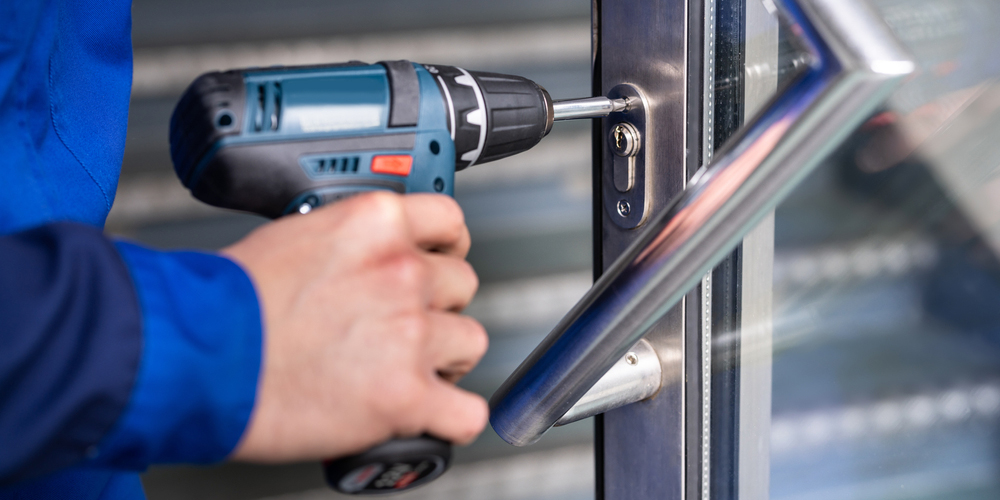
Whether you are looking to handle commercial door lock replacement yourself or want to know how to communicate your issue to a commercial locksmith, this article will assist you. There is a lot to know about commercial door lock replacement. But there are three main categories the information can fall into.
Each section breaks down the underlying concepts into more digestible sections. I hope you read it all, but if you don’t have time (because you run a business), just contact a commercial door locksmith near you. A professional who has internalized this information and can evaluate your precise situation is immensely valuable.
For your commercial door lock replacement to be successful, you need to take several factors under consideration. Without accounting for these factors, you are likely to spend money on products you can’t use, shouldn’t use, or do not provide you with what you need. However, do not get tunnel vision and focus exclusively on your locks. Balance these considerations with the entirety of your physical security measures.
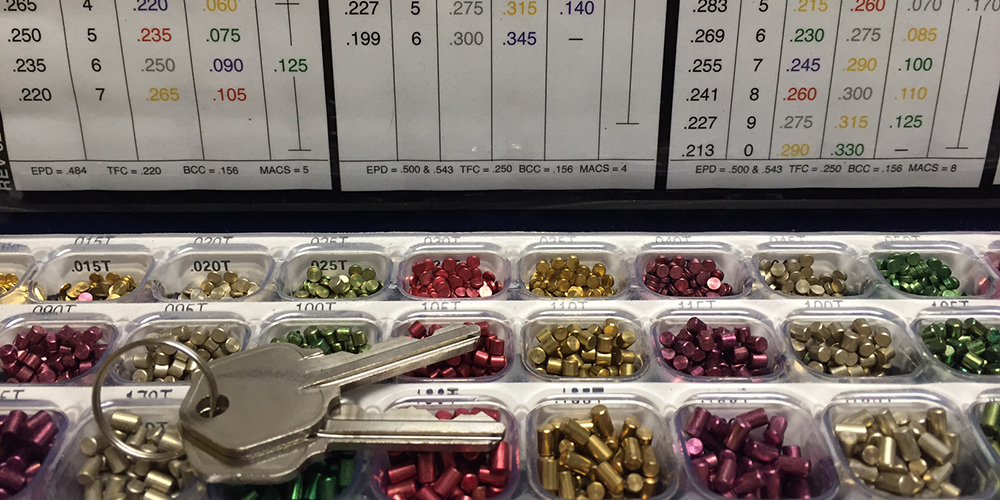
When you need to change locks, commercial door lock replacement is not always the only option. A less expensive and less intrusive option is to rekey your existing locks. The main difference between rekeying or replacing locks is that rekeying leaves all of your existing hardware, including the lock cylinder. Rekeying a lock only changes what key will work in the lock, and can add security pins to increase the lock’s level of protection. This is not a viable alternative for commercial door lock replacement if the lock hardware or cylinder.
Rekeying is perfect for instances where a key has been lost, stolen, or otherwise compromised. In these situations, it is time to change the locks in a way that invalidates all currently working keys. But you don’t have to fully change commercial door locks. Just change what makes a particular key work. Your basic commercial door lock uses stakes of pins with varying heights, that correspond to the grooves on your keys. Change the pins to different heights, and you change the key that will open the lock.
When you change the pins, you change the lock enough that only a new key will work. This makes rekeying a great option for making multiple commercial locks work with the same key, to cut down on the number of keys each employee needs to carry. However, if the various locks you want to key alike each have unique cylinders, they cannot be keyed the same because the keys will be different sizes, shapes, etc. You may need a commercial door lock replacement to rekey several locks to work with the same key.
Key Takeaways:

If you intend to keep your existing door or wish to replace a lock cylinder without fully replacing the lock hardware, you have to pay close attention to all the dimensions. You will need your new locks to fit with whatever it is you intend on putting them in. Luckily most modern offices and storefronts use standard door sizes, which are cut in standard ways to fit standard commercial locks. But of course, commercial door lock replacement can’t be as simple as that. Some extenuating circumstances can complicate what should be a very standard process.
Even if you are purchasing replacement parts that look identical to what you are already using, there may be some slight differences that cause a bit of further difficulty. For example, if your commercial door lock replacement deals with the lock cylinder of a mortise lock, even with the new cylinder having the exact dimensions, the set screw for the cylinder could still be too short. The gutters on the side of the cylinders can be exceptionally deep to the point where the set screws do not reach far enough to secure the cylinder.
Besides perhaps needing a longer or shorter set screw for your cylinder, the cylinder itself may not have the correct diameter. If your cylinder is too small you can purchase a retaining ring, but a cylinder that is too wide may require the door to be drilled or may not be installable. The cam on the back of your cylinder also has to be the correct size and shape to manipulate the hardware. Always make sure you are using the right lock, and if needed consult with a locksmith to make sure everything is appropriately sized.
Key Takeaways:
Security is the primary reason for putting a lock on a door. So make sure you consider how your lock is protecting you when you undergo commercial door lock replacement. You are trying to deny access to all unauthorized parties, but also prevent criminals from successfully carrying out theft or vandalism. Although every lock can be picked most criminals do not pick locks. They are more likely to use bump keys or bypass methods, and most commonly rely solely on brute force/destructive entry. So you need locks that specifically buttress your security against these more likely attacks.
Even though it is unlikely that you will have to contend with lock picking, anti-picking protections can prevent lock bumping and even drilling attacks from being successful. Security pins will make bump keys less effective, if not completely useless. And hardened steel pins will defend your lock from most drill bits. You can also use different lock styles such as disk detainer locks which cannot be bumped open and are more difficult to drill/bypass. Always consider these types of upgrades when you are going through a commercial door lock replacement.
You also have to be aware of various bypasses and simple exploits that various commercial door locks are vulnerable to. Certain Adams Rite mortise locks with the spring latch and locking bare have an exploit that requires no knowledge of lock picking to bypass (demonstration). And the extremely hardy swing bolt system has an even easier bypass. Being cognizant of these exploits is reason enough for a commercial door lock replacement. But you certainly need to be mindful not to add these vulnerabilities to your security when you replace your lock.
Key Takeaways:
Besides the lock’s physical construction, it can also provide better security through key control. This is especially important with retail security, as anyone with a key has access to your products. So make sure only authorized employees have keys. Certain high-security locks use proprietary key technology, which makes it extremely difficult for unauthorized copies to be made. A do not duplicate stamp or etching is not going to stop anyone from making a duplicate key at a self-serve key machine, which is available in every hardware store.
If you are taking office security seriously, you need a plan for key control with your commercial door lock replacement. Certain products and manufacturers such as Medeco, Abloy Protec, and Mul-T-Lock have this built-in. Criminals who have access to a working key can still find ways to make copies, but more sophisticated attacks like this are unlikely to be something your average office or storefront will be facing.
Another key control consideration for commercial door lock replacement is whether or not the building uses a master key system. To maintain the master key system, you will need to repin your replacement locks. This type of repinning is best left to a locksmith who has access to the materials you need, such as replacement pins and master wafers. And you will have to make sure that your new lock uses the same key profiles as all existing locks in the master key system.
Key Takeaways:
Points of egress, refer to the thresholds used to exit a structure (ingress being points of entry). In the case of commercial buildings, many local and city ordinances require emergency exits. This means you have to be sure that your commercial door lock replacement does not result in adding a keyed cylinder where there should be a thumbturn or removing a necessary panic bar. You should be very cautious if you are changing the type of locks your door is using, and always check that you are in compliance with the law.
Usually, this is only a consideration during business hours where customers and visitors are present, but if you are dealing with a commercial building you still need to consider OSHA’s emergency exit fact sheet. Do not allow the ways you go about ensuring the ease of egress to undermine your overall security and be sure to balance this precaution when you are going about your commercial door lock replacement. There are also ADA (Americans with Disabilities Act) regulations that locks must comply with to allow disabled patrons and staff to enter and exit comfortably.
Key Takeaways:
The main difference between commercial locks and residential locks is that a commercial-grade door lock is built to withstand more use. Each time you use a key or turn a handle, internal components are being stressed. Over time this stress will result in damage. Commercial locks use stronger parts so that they can be used more without breaking. This is to contend with the heavier traffic businesses experience, as compared to a household.
Stronger locks require stronger metal and more of it. This results in the higher cost of these products. Most manufacturers will deliver cheaper locks at a lower price point by using plastic parts, low-quality metal, and as little metal as possible. When you are trying to reduce the cost of commercial door lock replacement, getting less expensive locks will often add up to a product that is not going to last as long. There are several ways to save money on replacement storefront locks, but buying the cheapest commercial door hardware is not recommended.
When you are comparing different commercial locks, search for how many cycles the lock is tested to withstand. The ANSI grading system classifies grade 2 locks as recommended for light commercial use (certified for 400,000 cycles). Grade 1 will provide functionality for twice as many cycles (800,000). Most companies will only need a grade 2, but you will need to consider how much traffic each door gets, and how often it is locked and unlocked during a usual day.
Key Takeaways:
There is an almost endless number of commercial door lock products, so the specifics of commercial door lock replacement will vary. It is important to extrapolate out the information in each section and apply what is relevant, while disregarding what doesn’t pertain to your situation. If you need help identifying your lock, reach out to a locksmith, but the most common types of commercial door locks fit into the following categories:
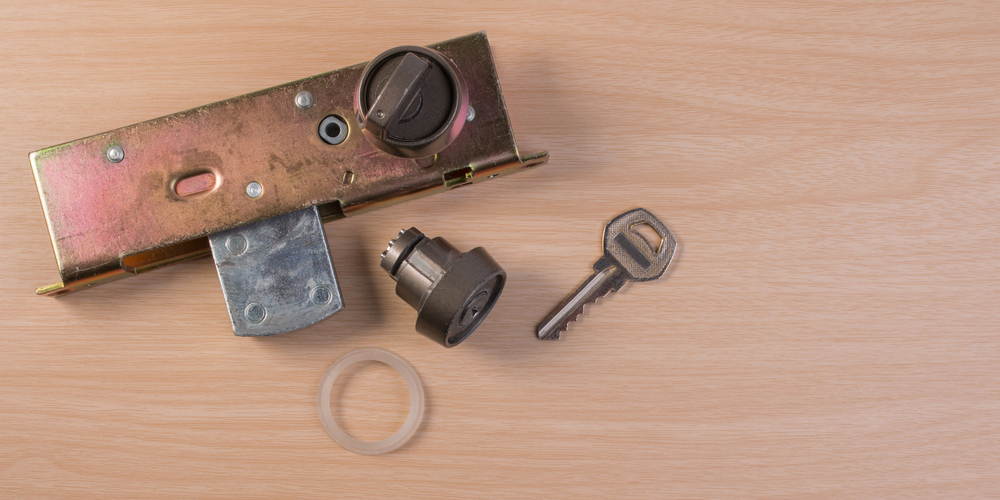
The most common locks used on storefront door hardware are Adams-Rite locks (aka. aluminum storefront door locks, glass storefront door locks). This means when it comes to the average commercial door lock replacement, you will be dealing with mortise locks. The name mortise lock refers to the pocket (aka mortise) that is carved into the door, which the lock slides into. Your new lock will need to slide into the same pocket or your new cylinder will have to secure into the door/hardware.
You can tell that your door uses a mortise lock by opening the door and looking at that latch/bolt. A mortise lock’s latch/bolt will be surrounded by a rectangular piece of metal, secured to the door with a set of screws. Commercial door lock replacement for mortise locks will be more straightforward than other types of locks.
The basic process for replacing an Adams-Rite lock breaks down to the following:
You can see the basic process demonstrated in video form. And this will also give you some insight as to whether the lock you are looking to replace is a mortise lock. The lock may be a keyed handle or even just an unkeyed knob. The process of commercial door lock replacement for interior handles and knobs can be understood better through watching the process. The trickiest aspect of which will be to find the small hole on the rose of the lock and access a tool that will fit inside it.
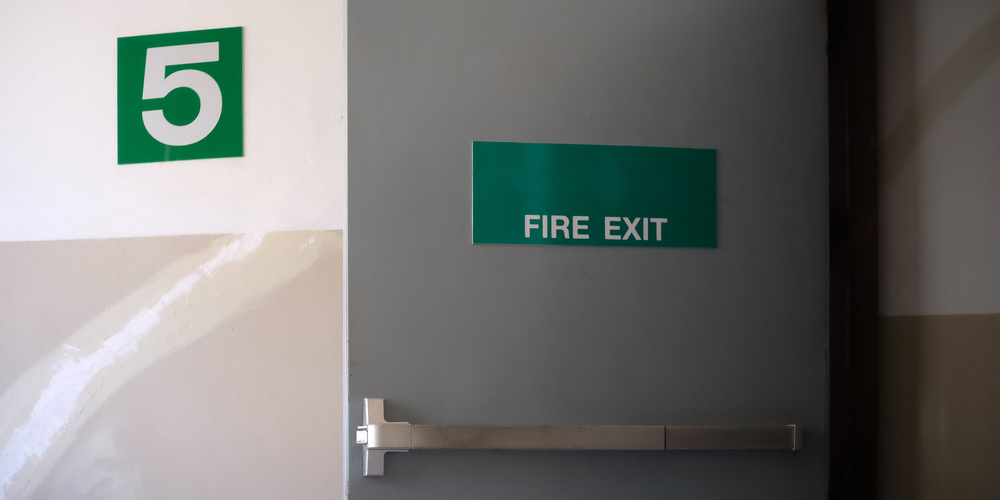
Push bars (aka panic bars or exit bars) are intended less for security and more for safety or convenience. But unlike bathroom door locks, which are intended to merely suggest a denial of access, push bars can offer commercial-grade security on the side of ingress. The commercial door lock replacement process from push bars breaks down into these steps:
Be careful not to over-tighten screws during installation, as this can cause the lock to jam. If you have to drill additional holes, be careful to align everything properly and use a level to assure the bar will rest correctly on the door. To see how a professional locksmith installs a push bar, check out this video overview.
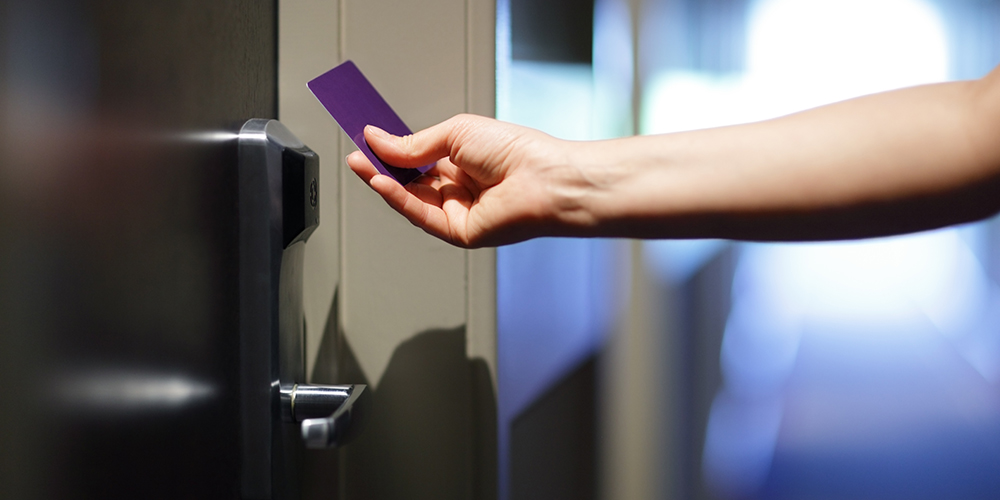
Many commercial buildings these days use electronic locks. If your electronic locks are hardwired, which is common in commercial spaces, you should not be replaced without professional oversight. The only electronic locks you should attempt to install yourself will be battery-powered. Battery-operated electronic locks are intended for residential use and are not as complicated to remove or replace. Referring to the documentation they come with will give you an overview of the process.
I can only recommend using a commercial door locksmith near you for commercial door lock replacement involving electronic locks. Messing with wiring in a commercial space is not advised unless you are a trained professional. A locksmith who works with commercial-grade electronic locks will be able to do the work, just make sure to specify that the commercial door lock replacement will pertain to electronic locks.
Even if your business uses a magnetic lock system, this is still an electronic lock. The magnet uses a charge to generate a magnetic field, and without electricity will not be able to lock a door. These types of locks fall into the category of fail-safe, which means in the event of a power outage the door will be open. This may be required for your commercial space or industry. But if you need a product that is fail-secure (cannot be opened without power), you will need a different type of electronic lock.
Now that you know enough about commercial door lock replacement, it is time to determine who will do the actual work of removal and installation. If the commercial lock has broken in a way that has left you locked out of the building, I would recommend looking for the best lockout service in your area and worry about replacement later. But outside of emergencies, consider the following options for service:
Hiring a commercial door locksmith near you is going to be the best service option for business owners and managers. You are guaranteeing the work will be done properly, accounting for any local and federal laws. Locks can be recommended and provided by the locksmith. Having a locksmith handle your commercial door lock replacement is the only service option that comes with all the specific experience and knowledge you need.
Commercial door lock replacement is a business expense, but you still do not want to pay more than what is reasonable. You can look over the complete guide to locksmith prices, but the main focus should be on the labor costs for commercial lock changes. Often this will end up costing around $50 on the low-end, which does not include the cost of replacement parts. If the locks are more complex to install, such as electronic locks, this is likely to be more expensive.
It is a good idea to build up a relationship with a local locksmith, so you have a company you can trust for any future security or lock-related issues. Chances are you are going to need more than just one commercial door lock replacement during the lifespan of your business, and lock changes are unlikely to be the full extent of the services you will require. For example, you could get locked out of your safe, need new keys, rekeying locks after employees leave, etc.
Some business owners or property managers have the availability to do this work themselves. If you have the time to spend on researching parts, ordering locks, and doing the labor, still consider your level of experience. When locks are improperly installed, the chances of lockouts, broken keys and the need for another lock replacement are greatly increased. All of these potential issues will cause downtime for your business.
If you are still set on doing this work yourself to reduce the cost of changing locks, be sure to watch several videos on the process you will be performing. Anticipate issues if you are installing/replacing different products than what is being shown in the video. Do not over-tighten screws, and be very careful when drilling additional holes into existing doors.
The reason for building management being the last option in this list is purposeful. Chances are this is your first thought, and if it were an option then you would not need an article like this. Or you are a building manager who is looking for who to hire for this service.
If you think this is not available to you, I would advise you to double-check because your landlord has a responsibility not to ignore certain door lock problems which may leave them legally responsible for potential loss. If you are a building manager, see the locksmith section above.
Leaving this task to building management will be the best and easiest way to save money on your storefront door locks when it is on the table. And should be on the table when it is putting the business in danger. Now, this may be a source of debate between yourself and the property manager, but if you can make your argument, you can get reimbursement.
The most important thing is to get the issue taken care of, as soon as it becomes clear that it is creating a threat or severe enough problem. By talking to a professional locksmith, you can get the information you need to make the case to whoever is denying the responsibility to facilitate the commercial door lock replacement.
A commercial door locksmith near you is going to save you time, which means saving you money. Any questions you have can be answered by a professional, and you can trust that you are not sacrificing quality for what may be perceived as savings. Commercial door lock replacement is only a small part of why every business needs a security budget, but it is important to calculate how much you gain by using a qualified locksmith service.
Category: Commercial, Lock Types